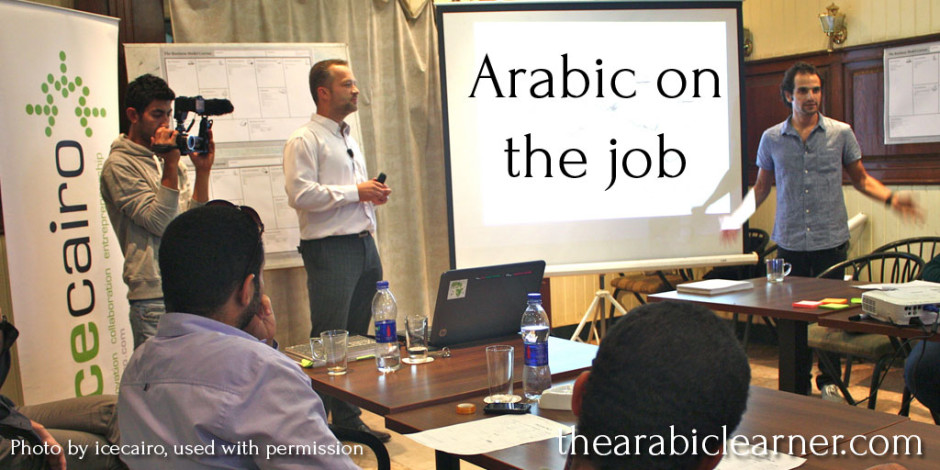People often say that when you dream in a language that you have been learning, you are really becoming fluent. For me, there is something that is much more practical and a better measure of reality if you want to learn Arabic language. That’s when you can work in Arabic. Not just study it, or have casual discussions in academic settings.
Four non-native speakers who used Arabic effectively at work
Over my past 25 years in the Arab world, I have come across four non-native Arabic speakers whom I have seen learn Arabic language effectively and use it in their day to day work. I have definitely met more than these four, but they are the ones that stick out in my mind.
 The first was an Arabic teacher of mine whose name is Lisa White. Lisa is a teacher at the American University in Cairo, in the Intensive Arabic Program. When I first met Lisa in 1991, I was shocked to see her speaking Arabic fluently despite the fact that she is American, and even more shocked to find her teaching it. I had previously had non-native speakers of Arabic as Arabic language teachers at the University of Toronto, but in my mind I knew that was different. Lisa’s Arabic was not limited to the academic texts she prepared in advance. She was comfortable in the language, could (seemingly, to me at least) talk about anything in it with her Egyptian colleagues, and could naturally teach and transfer the language to us, her students.
The first was an Arabic teacher of mine whose name is Lisa White. Lisa is a teacher at the American University in Cairo, in the Intensive Arabic Program. When I first met Lisa in 1991, I was shocked to see her speaking Arabic fluently despite the fact that she is American, and even more shocked to find her teaching it. I had previously had non-native speakers of Arabic as Arabic language teachers at the University of Toronto, but in my mind I knew that was different. Lisa’s Arabic was not limited to the academic texts she prepared in advance. She was comfortable in the language, could (seemingly, to me at least) talk about anything in it with her Egyptian colleagues, and could naturally teach and transfer the language to us, her students.
 The second person was someone I met while working as a consultant in the Egyptian Ministry of Education. I confess that I do not remember her name, but she was delivering a talk to a group of about 1000 Egyptian English teachers that we were training, and was very effective. She was also very outgoing and funny… in Arabic. Despite the fact that she was British. Although her content was about teaching English, she delivered it mostly in Arabic, and had the trainees captivated and engaged the whole time. She would launch into jokes, side stories, or political rants. This was just before the Iraq war in 2003, and I remember a button she had pinned on her jacket which said لا لضرب العراق (No to striking Iraq).
The second person was someone I met while working as a consultant in the Egyptian Ministry of Education. I confess that I do not remember her name, but she was delivering a talk to a group of about 1000 Egyptian English teachers that we were training, and was very effective. She was also very outgoing and funny… in Arabic. Despite the fact that she was British. Although her content was about teaching English, she delivered it mostly in Arabic, and had the trainees captivated and engaged the whole time. She would launch into jokes, side stories, or political rants. This was just before the Iraq war in 2003, and I remember a button she had pinned on her jacket which said لا لضرب العراق (No to striking Iraq).
 The third person is a good friend of mine named Benjamin Sellé. Benjamin is from France and worked until recently in an NGO in Egypt that teaches entrepreneurialism and business skills to Egyptian young people. He is passionate about agriculture, people, his work, and motorcycles, and he is regularly engaging with everyone around him in Arabic about any and all of these topics. Basically, everyone loves the guy, and he is everyone’s best friend. Benjamin is the most fluent non-native speaker of Arabic that I know, and seems equally comfortable in English, French, or Arabic.
The third person is a good friend of mine named Benjamin Sellé. Benjamin is from France and worked until recently in an NGO in Egypt that teaches entrepreneurialism and business skills to Egyptian young people. He is passionate about agriculture, people, his work, and motorcycles, and he is regularly engaging with everyone around him in Arabic about any and all of these topics. Basically, everyone loves the guy, and he is everyone’s best friend. Benjamin is the most fluent non-native speaker of Arabic that I know, and seems equally comfortable in English, French, or Arabic.
The final person I will describe is me. To be clear, I do not see myself on the level of the people I have described above, nor does my work situation require me to use Arabic on a daily basis (my family situation does, but I wrote about that previously). Having said that, I do use Arabic from time to time intensively in my work as a consultant. I am able to joke, have fun, and talk about all kinds of everyday topics, but to actually focus in on heavy-duty, work-related content stretches me when it’s for extended periods of time.
One time I was running a 3 day training workshop for tax collectors and managers in the Egyptian Tax Authority. Much of the work boiled down to showing them how to use Microsoft Office Apps (sigh…), but doing it all in Arabic made for an interesting twist for me. A second example was running a two day training for teachers and administrators in Ismailia to learn how to use some web-based teacher-conferencing software I had developed. As much as I felt my Arabic was rough and that I hacked through those days, rather than flowed through in beautiful proficiency, in the end the job got done. People went home having learned something, and on that basis, my Arabic was successful.
Busting the myth that it is impossible to learn Arabic language well
Last week in an interview with Dr. Kirk Belnap, the head of Arabic instruction in the Department of Asian and Near Eastern Languages at Brigham Young University, and Director of the National Middle East Language Resource Center (prior to it being de-funded by the US government), we discussed the whole issue of non-native Arabic speakers achieving proficiency. One of the key points that Kirk kept emphasizing was that we need to bust the myth that Arabic is impossible to learn well as a non-native speaker. Although this belief is not usually stated openly, it is held by many students as well as teachers of Arabic, whether native speakers or non-native speakers.
The fact is that Arabic can be learned well. Well enough to use in work, and in every day situations. A non-native speaker can learn Arabic to the point where they can function fully in it.
Here are five key points that Kirk and I discussed, that help people move toward actual proficiency in Arabic. You will notice that they are not so much technical issues related to Arabic itself, but more about mindset and self-direction.
1. Setting goals based on needs
Learners who set clear goals of what they want to learn in each 1-3 month step of Arabic language learning will be much more effective than those who do not. These goals should be focused on the actual needs of the learner, for example in their job or everyday life.
2. Having a growth mindset
Persistence over the long run, with a belief that you can and will become fluent in Arabic, is absolutely vital. Understanding that growth takes place over time, but it does and will take place as you push toward your goals.
3. Emotional self-regulation
Being able to regulate your emotions about language learning enables you to learn without hindrance. Fear of being wrong can be replaced with eagerness to have my errors corrected. Fear of being laughed at can change to me being relaxed and enjoying growing through my mistakes. Lack of motivation can be replaced with a clear focus on my goals. Tiredness and apathy can be replaced with focused energy.
4. Finding teachers/mentors who believe you can learn
Whoever is teaching you Arabic must believe that your end-goal of becoming proficient in the language is attainable and realistic. If they don’t, replace them. Their mentality will influence you, and become a self-fulfilling prophecy.
5. Focus on narrow topics intensively
This is related to the first point. Use your own interests or professional needs to focus you into narrow areas of vocabulary and content. According to Kirk, learning Arabic through content-based classes has proven to be more effective than just language-focused classes. So whether in the classroom or out of it, let your content needs focus your Arabic learning.


 RSS - Posts
RSS - Posts